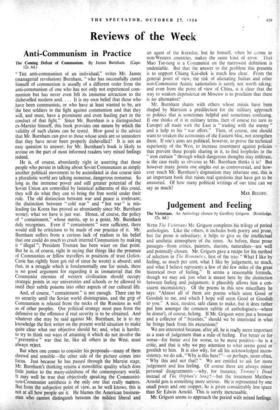Reviews of the Week
Anti-Communism in Practice
The Coming, Defeat' of Communism. 12s. 6d.) By James Burnham. (Cape.
" THE anti-communism of an individual," writes Mr. James (managerial revolution) Burnham, " who has successfully cured himself of communism is usually of a different order from the anti-communism of one who has not only not experienced com- munism but has never even felt its immense attraction to the dishevelled modem soul. . . . It is my own belief that those who have been communists, or who have at least wanted to be, are 'the best soldiers in the fight against communism and that they will, and must, have a prominent and even leading part in the conduct of that fight." Since Mr. Burnham is a distinguished ex-Marxist himself, this book provides one means by which the validity of such claims can be tested. How good is the advice that Mr. Burnham can give to those whose souls are so unmodern that they have never been properly dishevelled? It is not an easy question -to answer; for Mr. Burnham's book is likely to arouse on the part of most informed readers very mixed feelings indeed.
He is, of course, abundantly right in asserting that those people who persist in talking about Soviet Communism as simply another political movement to be assimilated in due course into a pluralistic world are talking nonsense, dangerous nonsense. So long as the immense power and still greater potential of the Soviet Union are controlled by fanatical adherents of this creed, they will do what they can to bring the free world under their rule. The old distinction between war and peace is irrelevant; the distinction between " cold war " and " hot war " is mis- leading (as Korea has proved so abundantly since Mr. Burnham wrote); what we have is just war. Hence, of course, the policy of " containment," whose merits, up to a point, Mr. Burnham duly recognises. Even if " containment " were sufficient, there would still be criticisms to be made of our practice of it. Mr. Burnham suffers from a curious lack of realism in his belief that one could do much to crush internal Communism by making it " illegal "; Preident Truman has been wiser on that point. But he is, of course, right in saying that things like the presence of Communists or fellow travellers in positions of trust (Joliot- Curie has rightly been got rid of since he wrote) is absurd; and that, in a struggle which is fundamentally one for minds, there is no good argument for regarding it as immaterial that the Communist enemies of western civilisation should occupy strategic points in our universities and schools or be allowed to instil their subtle poisons into other aspects of our cultural life.
And, of course, " containment " is not enough. There can no security until the Soviet world disintegrates, and the grip of Communism is relaxed from the necks of the Russians as well as of other peoples. Our political strategy must pass from the defensive to the offensive if real security is to be obtained. And whatever else may be said against Mr. Burnham, he is to my knowledge the first writer on the present world situation to make quite clear what our objective should be; and, what is harder, to try to think out ways of attaining it which do not involve the preventive " war that he, like all others in the West, must always reject.
But when one comes to consider his proposals—many of them shrewd and sensible—the other side of the picture comes into focus. Just because he has passed through the Marxist stage, Mr. Burnham's thinking retains a monolithic quality which does little justice to the many-sidedness of the contemporary world. It may well be true that objectively speaking the Communist- -non-Communist antithesis is the only one that really matters. But from the subjective point of view, as he well knows, this is not at all bow people see it. He blames the American business- man who cannot distinguish between the mildest liberal and an agent of the Kremlin; but he himself, when he comes to non-Western countries, makes the same kind of error. That Mao Tse-tung is a Communist on the narrowest definition is undeniable. But that the answer to the problem this presents is to support Chiang Kai-shek is much less clear. From the general point of view, the risk of alienating Indian and other non-Communist Asiatic nationalists is surely not worth taking; and even from the point of view of China, is it clear that the way to weaken dependence on Moscow is to proclaim that there is no alternative?
Mr. Burnham shares with others whose minds have been shaped by Marxism a predilection for the military approach to politics that is sometimes helpful and sometimes confusing. If one thinks of it in military terms, then of course (to turn to Europe) all trade with the East is " trading with the enemy " and a help to his " war effort." Then, of course, one should want to weaken the economies of the Eastern bloc, not strengthen them. If one's aims are political, however, to prove the technical superiority of the West, to increase resentment against policies that prevent these people sharing in it, to find loopholes in the " iron curtain " through which dangerous thoughts may infiltrate, is the case really as obvious as Mr. Burnham thinks it is? But however many points one singles out as controversial, and how- ever much Mr. Burnham's dogmatism may infuriate one, this is an important book that raises real questions that have got to be answered. Of how many political writings of our time can we say as much?
MAX BELOFF.


















 Previous page
Previous page